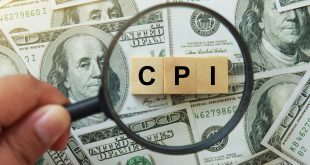The governor of the Bank of England has hit back at critics who accused him of being asleep at the wheel while inflation soared and a cost of living crisis hit UK living standards.
Andrew Bailey defends response to Covid pandemic and indicates that the British central bank will not take aggressive approach to raising interest rates
Bailey said he rejected the argument that ‘the Bank’s monetary policy committee let demand get out of hand and thus stoked inflation’.
Bailey also said the nature of the shock meant higher interest rates could damage the economy, which recovered slowly from the pandemic during 2021.
Speaking at a conference in Vienna, he said high energy prices would do much of the work to depress consumer spending, allowing the central bank to take a less aggressive approach to raising interest rates.
“What I reject is the argument that in our response to Covid, the Bank’s monetary policy committee [MPC] let demand get out of hand and thus stoked inflation,” he said. “The facts simply do not support this. On the latest number, UK GDP in March was only 0.6% above its pre-Covid level, and it is substantially below the path it was expected to follow pre-Covid.”
Bailey’s comments are likely to be interpreted as a notice that the MPC will stop short of increasing interest rates from 2% to 3% in the next year as expected by most City economists.
Bailey, who chairs the MPC, added that while low unemployment and a high level of vacancies were leading to a “tight labour market”, this was not the result of buoyant spending on Britain’s high streets, but rather that the number of people seeking work had dropped.
“What we do have is a very tight labour market. But that does not look like a story about rapid demand growth,” he said. “The labour force has shrunk by around 1% since the onset of Covid. It looks much more like an impact from the supply of labour.”
About 500,000 people who worked before the pandemic have stopped looking for a job, most of them over the age of 50. Another 500,000 who were expected to emigrate to the UK, mostly from eastern Europe, over the last two to three years have not done so.
The Bank has raised rates four times, from 0.1% to 1%, and is widely expected to increase them at least twice this year to 1.5%.
Bailey’s comments came as the head of the European Central Bank (ECB), Christine Lagarde, said the eurozone’s negative rates would end this year.
Signaling a policy shift to more rapid rate rises, she said the ECB was on track to lift its main policy rate from -0.5% back to zero by the end of September, causing the euro to strengthen against sterling and the US dollar.
Lagarde wrote in a blog that “based on the current outlook” the institution was “likely to be in a position to exit negative interest rates by the end of the third quarter”.

 Noor Trends News, Technical Analysis, Educational Tools and Recommendations
Noor Trends News, Technical Analysis, Educational Tools and Recommendations




